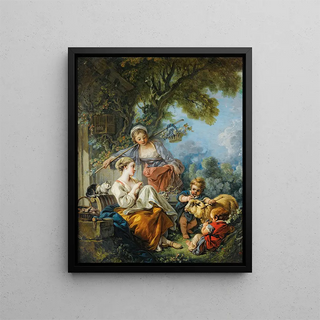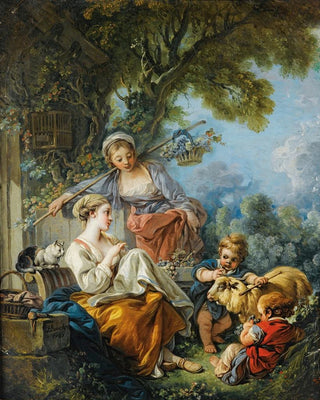Pastoral Scene Painting - François Boucher | Art print


View from behind

Frame (optional)
The artwork "Pastoral Scene" by François Boucher evokes a world of softness and serenity, where nature blends seamlessly with the daily lives of the characters. This painting, emblematic of the Rococo style, transports us to an idyllic realm where love and beauty harmoniously coexist. Through this pastoral scene, Boucher manages to capture the essence of an era—the 18th century—where art and life intertwine to create compositions of unmatched lightness and delicacy. The gentle light bathing the characters, the choice of pastel colors, and the fluidity of forms create a dreamlike atmosphere, inviting the viewer to immerse themselves in this enchanted reality.
Style and uniqueness of the work
Boucher stands out for his ability to blend realism and idealization. In "Pastoral Scene," every detail is carefully crafted to evoke perfect beauty. The characters, dressed in elegant costumes, seem to move within a living tableau, where nature is both a backdrop and a protagonist. The composition is dynamic, with graceful curves guiding the eye across the painting. The flowers, trees, and rivers, all painted with remarkable precision, enhance the harmony of the entire piece. The Rococo style, characterized by its exuberance and lightness, finds its peak here. The work exudes subtle sensuality, an invitation to escape and contemplation, while celebrating the simple pleasures of life.
The artist and his influence
François Boucher, born in 1703, is one of the most representative artists of the Rococo movement. Trained at the Royal Academy of Painting and Sculpture, he established himself as a master of decorative painting. His influence extends well beyond his time, inspiring many contemporary and subsequent artists. As the official painter of the court of Louis XV, Boucher captured the spirit of his era, blending refinement and sensitivity. His works, often imbued with a certain lightness, reflect the aspirations of a society seeking beauty and pleasure. "Pastoral Scene"

Matte finish

View from behind

Frame (optional)
The artwork "Pastoral Scene" by François Boucher evokes a world of softness and serenity, where nature blends seamlessly with the daily lives of the characters. This painting, emblematic of the Rococo style, transports us to an idyllic realm where love and beauty harmoniously coexist. Through this pastoral scene, Boucher manages to capture the essence of an era—the 18th century—where art and life intertwine to create compositions of unmatched lightness and delicacy. The gentle light bathing the characters, the choice of pastel colors, and the fluidity of forms create a dreamlike atmosphere, inviting the viewer to immerse themselves in this enchanted reality.
Style and uniqueness of the work
Boucher stands out for his ability to blend realism and idealization. In "Pastoral Scene," every detail is carefully crafted to evoke perfect beauty. The characters, dressed in elegant costumes, seem to move within a living tableau, where nature is both a backdrop and a protagonist. The composition is dynamic, with graceful curves guiding the eye across the painting. The flowers, trees, and rivers, all painted with remarkable precision, enhance the harmony of the entire piece. The Rococo style, characterized by its exuberance and lightness, finds its peak here. The work exudes subtle sensuality, an invitation to escape and contemplation, while celebrating the simple pleasures of life.
The artist and his influence
François Boucher, born in 1703, is one of the most representative artists of the Rococo movement. Trained at the Royal Academy of Painting and Sculpture, he established himself as a master of decorative painting. His influence extends well beyond his time, inspiring many contemporary and subsequent artists. As the official painter of the court of Louis XV, Boucher captured the spirit of his era, blending refinement and sensitivity. His works, often imbued with a certain lightness, reflect the aspirations of a society seeking beauty and pleasure. "Pastoral Scene"
12,34 €






